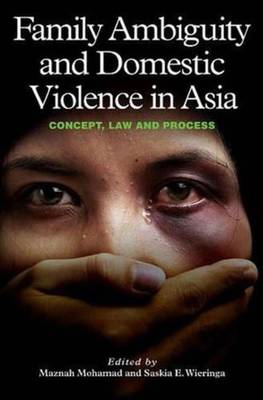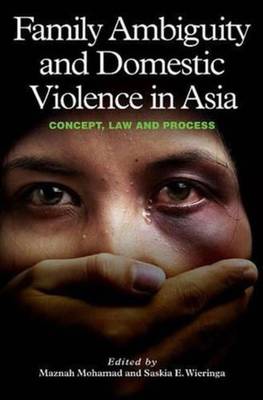
- Retrait gratuit dans votre magasin Club
- 7.000.000 titres dans notre catalogue
- Payer en toute sécurité
- Toujours un magasin près de chez vous
- Retrait gratuit dans votre magasin Club
- 7.000.000 titres dans notre catalogue
- Payer en toute sécurité
- Toujours un magasin près de chez vous
Family Ambiguity and Domestic Violence in Asia
Concept, Law and Process
132,95 €
+ 265 points
Description
This book revisits the issue of Domestic Violence (DV) in Asia by exploring the question of family ambiguity, and interrogating DV's relationship between concept, law and strategy. Comparative experiences in the Asian context enable an examination of the effectiveness of family regulations and laws in diverse national, cultural and religious settings. Key questions relate to the limits and relevance of the human rights discourse in resolving family conflicts; the extent to which power and control in intimate relationships can actually be regulated by a set of inanimate, homogeneous and uniform policies and legislations; and how the state relates to the family as an "ambiguous" unit given state rules of governance that perpetuate unequal gender relations. Many of the difficulties in understanding DV have sprung from the fact that the family unit is ambiguous. When the state intervenes (e.g. reproductive health) the family is treated as a public concern; yet with respect to individual human/multicultural rights, the family is considered a private domain. Complications and contradictions arise with regard to different legislative/religious practices across Asia: for example, the enforcement of Sharia; technocratic imperatives with regard to demographic goals of marriage and reproduction; and state interference of gender imbalances and inequality. The politics and culture around DV is thus a mirror of modern-day Family-State collusion, which sustains rather than curtails discrimination based on sexuality and gender. This book views gender inequality for instance in relation to heteronormativity as the fundamental basis of intimate violence, rather than violence as a generic and neutral phenomenon, requiring generic solutions. It offers news theoretical insights to the conceptualisation of the family, culture and law with respect to DV. And it provides reasoned new perspectives on the effectiveness/inadequacy of present policies, laws and enforcement strategies against domestic violence in Asia.
Spécifications
Parties prenantes
- Editeur:
Contenu
- Nombre de pages :
- 256
- Langue:
- Anglais
- Collection :
Caractéristiques
- EAN:
- 9781845195557
- Date de parution :
- 06-06-13
- Format:
- Livre relié
- Format numérique:
- Genaaid
- Dimensions :
- 160 mm x 230 mm
- Poids :
- 462 g






